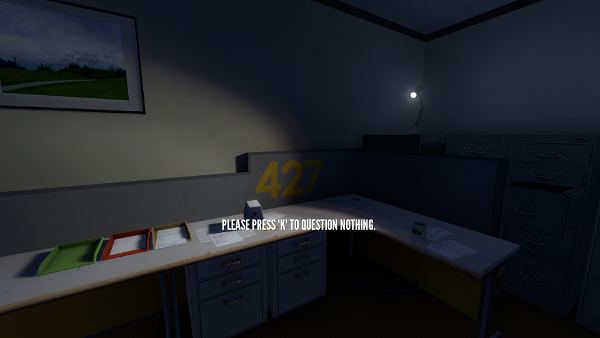
The Stanley Parable is a truly difficult game to describe without spoiling specific details or awe-inspiring moments. As the name suggests, our character Stanley is at a point in his life where the mundane and repetitious behavior that he conducts at work on a daily basis, as employee #427, is becoming a problem. The Stanley Parable is a game that explores familiar territory for anyone that feels that his or her life is in need of a change for the better. It employs lighthearted wit, dark humor, and even themes of helplessness and terror. As I try my hardest to describe The Stanley Parable without cheating prospective players of the experience, I will highlight why this game is a must-play delight and a worthwhile venture for horror fans.
Oh, look at him. CJ Melendez, video game blogger for RelyOnHorror. He’s at it again, trying another non-horror game, scrounging its depths for elements that he deems worthy of an “Honorable Mention” in the horror genre. His quest may fail but, that’s alright. He’s on a journey that we’ll take together. I’m quite excited to see what he’s going to say. Perhaps, it will make sense. Perhaps, it will reek of desperate hyperbole. Who I am to judge? I’m just here as a spectator, just like you.
Every road in The Stanley Parable leads to a new story. Like paths in a timeline of alternate history, each of these roads begins at the doorway to Stanley’s cramped, dark office and branch out into different places and situations unexpectedly. Stanley, our hero, has no personality. He has nothing of interest about him. It is the player that dictates his actions–actions that are quickly and thoroughly supported or criticized by The Narrator.
Here it comes. I know what he’s going to say, and it hurts me.
The Narrator can easily be described as several different creatures. He’s either a subconscious manifestation of Stanley, meant to break him out of the mold that is his button-pusher life, a divine entity meant to steer Stanley to happiness (AKA God), or lastly – and simply – Satan.
Are you joking!? That’s vile, but flattering. But vile! How could he say such a thing about me? After all I’ve done for him, you would think that he’d have a higher opinion of me. You don’t get good grades in school because you’re the intellectual here. -Sigh- At least describe how charming I am.

The Narrator’s dialogue is the highlight of The Stanley Parable. Based on what the player does, he will respond accordingly. This leads to many breaks in the fourth wall. Every action is judged or commented on by the entity that is The Narrator. Even doing nothing at all leads to some humorous moments. But it’s this incessant scrutinizing that leads to a feeling of inadequacy and stupidity on the player’s – and, of course, Stanley’s – part. The Narrator can either be your best friend, with only the purest intentions in mind, or an angry puppet master infuriated by his belief that free-will is a betrayal against him.
Has your mother ever told you that you’re a monster? Because, you are, in the most unflattering sense of the word. What I do for Stanley is for his good and his good only. What I’ve done for you is for your good. This betrayal, uh rather, this misunderstanding, yes, is exactly that; a misunderstanding. I’m here to help. For example, you were supposed to finish this article days ago but, you had dropped the ball. Who’s to blame for that? Me? No! It’s you! I said, “CJ, the charity stream can wait. What about your life? What about your writing? Don’t you want to publish another one of your brilliant articles? They might even read this one!”
Much of the horror in The Stanley Parable comes from the sense of the unknown. Why is this happening? Is this the right path to happiness? Is happiness an illusion? Is the illusion better than the reality of the situation? Some of these questions hit home, making players think about their own lives. Should we embrace complacency, or pursue the unknown for whatever rewards it may have despite the risks? The Stanley Parable delicately and humorously introduces these questions. If you’re the type of person inclined to reflect on such existential questions, you’re going see why this game can be very unsettling.
You’re over-thinking it! It’s a video game. When have video games ever been smart? Gamers don’t want to think or feel; they want to commit multiple felonies while screaming expletives at their 12-year-old peers. Do you think video games are art too? If you’re trying to say that The Stanley Parable is a video game worth “playing”– there aren’t even any guns in this –, then fine. I won’t stop you. I won’t even tell the readers to ignore you. I’ll let them play for themselves. When they come back to you and say, “CJ, I bought that game for X amount of currency and I was not satisfied. You exaggerated and now I can’t afford lunch on Monday. Give me a refund, CJ, you liar!”. I won’t be there for you.

To describe The Stanley Parable further would be a disservice to prospective players. What you can expect is a wonderfully charming, comedic, and surprising game that revels in fourth wall breaks and unexpected events. Playing The Stanley Parable for the first time will no doubt stupefy players. Don’t watch gameplay videos or even look up screenshots for this game. The experience hinges upon not knowing what the game will throw at you next and not knowing why.




